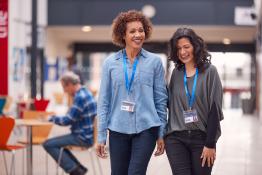Meet the Inclusion Team

 Dan Allerton taught physics for 23 years in secondary schools. He has had a variety of SLT positions from line managing STEM subjects to leading the student achievement and data management for the school. Since leaving teaching Dan has worked for University of Hertfordshire, delivering courses for teachers in Science and Physics. He then moved to the Institute of Physics to work on their Gender Balance project before joining the ASE to work on the Inclusion in Schools programme.
Dan Allerton taught physics for 23 years in secondary schools. He has had a variety of SLT positions from line managing STEM subjects to leading the student achievement and data management for the school. Since leaving teaching Dan has worked for University of Hertfordshire, delivering courses for teachers in Science and Physics. He then moved to the Institute of Physics to work on their Gender Balance project before joining the ASE to work on the Inclusion in Schools programme.
"Inclusion is important to me as I learnt early in my role of improving student achievement that students don't always fall into neat groups and that their experiences out of school need to be considered when thinking about appropriate interventions that can be used to raise their achievement. Since leaving teaching I now understand more about the importance of good careers guidance as this will have a direct impact on the futures of our students."
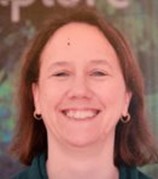 Becca Knowles has worked in education for over 30 years, initially as a chemistry teacher before moving into leadership and going on to work with STEM Learning on CPD development. She found a passion for ensuring teachers and students are exposed to the most up-to-date research to support excellence in teaching and leadership in schools. In 2020 Becca moved into consultancy and is currently supporting a number of projects including the Inclusion in Schools project and facilitating NPQ qualifications.
Becca Knowles has worked in education for over 30 years, initially as a chemistry teacher before moving into leadership and going on to work with STEM Learning on CPD development. She found a passion for ensuring teachers and students are exposed to the most up-to-date research to support excellence in teaching and leadership in schools. In 2020 Becca moved into consultancy and is currently supporting a number of projects including the Inclusion in Schools project and facilitating NPQ qualifications.
"The most exciting part of the work with Inclusion In Schools is supporting school leaders to effect and embed a change that helps young people to thrive in their schools."
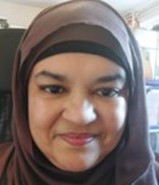 Dr Yeasmin Mortuza has been in secondary education for over 20 years, including roles as a middle leader, senior leader, and educational advisor for several London local authorities. Currently she is an educational consultant, specialising in secondary science, promoting positive teaching and learning pedagogy, improving formative assessment, narrowing gaps in progress and attainment, using data effectively, promoting positive behaviour for learning, and coaching middle leaders with development of department.
Dr Yeasmin Mortuza has been in secondary education for over 20 years, including roles as a middle leader, senior leader, and educational advisor for several London local authorities. Currently she is an educational consultant, specialising in secondary science, promoting positive teaching and learning pedagogy, improving formative assessment, narrowing gaps in progress and attainment, using data effectively, promoting positive behaviour for learning, and coaching middle leaders with development of department.
"The 'Inclusion in Schools' programme supports schools in developing their school vision, ethos, and provision for all learners by considering the factors that affect inclusion, equality, and representation. This is so that learning becomes fairer and equitable for all, and we can move towards ensuring that no child gets left behind."
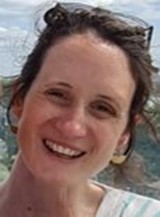 Rebecca Peacock has worked in education for over 15 years in a range of different schools and has held a range of different positions of responsibility from Key Stage 3 co-ordinator to Head of Physics. As a Head of Physics, Rebecca recognised that her classroom was mainly made up of boys but she didn't take proactive steps to question this or address it. She has now worked in inclusion based projects for over 7 years and aims to continue improving her knowledge each day.
Rebecca Peacock has worked in education for over 15 years in a range of different schools and has held a range of different positions of responsibility from Key Stage 3 co-ordinator to Head of Physics. As a Head of Physics, Rebecca recognised that her classroom was mainly made up of boys but she didn't take proactive steps to question this or address it. She has now worked in inclusion based projects for over 7 years and aims to continue improving her knowledge each day.
"Young people have a lot to deal with growing up. Schools must do more to make young people feel safe, valued and accepted. By tackling the tricky questions and opening the eyes of young people to wider opportunities and points of view, they can help prepare them for a bright future in a diverse society."
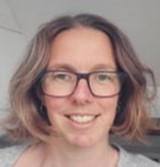 Vicki Parry has previously worked in glaciology, in physics teaching and the Improving Gender Balance project, at the Institute of Physics, before joining the Inclusion in Schools team at the ASE.
Vicki Parry has previously worked in glaciology, in physics teaching and the Improving Gender Balance project, at the Institute of Physics, before joining the Inclusion in Schools team at the ASE.
"School is an important step in making society more inclusive. Giving support to schools so they can improve access to opportunities for all their students as well as teaching about and modelling inclusion will hopefully help shape a society that is better for all students."
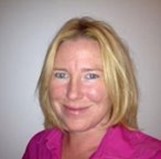 Esther Mander has worked on the Gender Balance project with the Institute of Physics since its inception in 2014 and has a background in project management, community work, and working with educational institutions.
Esther Mander has worked on the Gender Balance project with the Institute of Physics since its inception in 2014 and has a background in project management, community work, and working with educational institutions.
"To enable our younger generations the opportunity to make decisions without the barriers society and culture can place on them. The inclusion in schools project supports schools to empower their staff and students to make important and effective changes which will positively impact our society for the future."
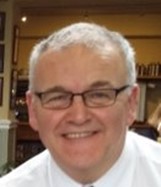
Martin Reece taught secondary science for 15 years before joining the Local Authority Advisory Team for Northamptonshire as a consultant. He is now an advisor working for a wide range of national organisations including AQA, STEM Learning and ASE, as well as working directly with individual schools on teaching and learning and leadership development.
"Like all teachers, I have always strived to do the very best for all of my students. Sometimes I would feel I had been successful for the vast majority of the students. But there would still be some students who I was aware that didn't fully meet their needs and this impacted on their progress. The Inclusion in Schools enables teachers to take a fresh look at the issues and challenges that prevent some students making the progress we, and they, want. The programme aims to empower teachers and schools to achieve what they aspire to do; provide education where every student can reach their full potential."
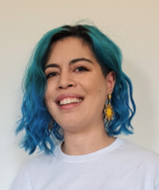 Sarah Cosgriff worked on the Improving Gender Balance programme at the IOP, before becoming an Inclusion in Schools Consultant at the ASE. In addition to her role at the ASE, Sarah works for Schools OUT UK, an LGBT+ education charity. As part of this role, she develops resources to help educators raise the visibility of LGBT+ people in the classroom.
Sarah Cosgriff worked on the Improving Gender Balance programme at the IOP, before becoming an Inclusion in Schools Consultant at the ASE. In addition to her role at the ASE, Sarah works for Schools OUT UK, an LGBT+ education charity. As part of this role, she develops resources to help educators raise the visibility of LGBT+ people in the classroom.
"Having an inclusive school environment can make young people feel like they belong and help them thrive. Achieving inclusion can feel like a daunting task. Through the Inclusion in Schools programme, schools work with our consultants to identify steps that they can take to becoming a more inclusive environment for their young people. Inclusion is also a marathon, not sprint: and so, as part our support, we help schools identify long-term priorities and put a realistic plan in place."
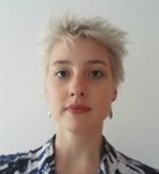 Roisin Ellison has worked in the education sector for a decade in various roles, from teaching to administration. She is currently the Inclusion in Schools Project Administrator, which she does part-time alongside completing her PhD in education policy.
Roisin Ellison has worked in the education sector for a decade in various roles, from teaching to administration. She is currently the Inclusion in Schools Project Administrator, which she does part-time alongside completing her PhD in education policy.
"Inclusion is important because everyone has a right to feel like they belong in society and schools are an integral part of this process for young people. The Inclusion in Schools programme is exciting because it encourages a whole-school approach, helping schools to embed inclusion in their school culture and ethos."
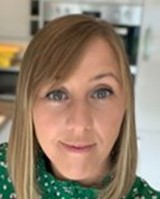 Deirdre Rodgers got her BSc at the National University of Ireland Galway before moving to England to train as a teacher. She taught for 10 years in disadvantaged schools and was also a Head of Year. After leaving teaching, she worked for the IOP on the Improving Gender Balance project and now for the ASE on the Inclusion in Schools project.
Deirdre Rodgers got her BSc at the National University of Ireland Galway before moving to England to train as a teacher. She taught for 10 years in disadvantaged schools and was also a Head of Year. After leaving teaching, she worked for the IOP on the Improving Gender Balance project and now for the ASE on the Inclusion in Schools project.
"Inclusion in Schools is about recognition, acceptance and celebration of people for who they are. An inclusive school fosters a culture of respect and belonging for all and also allows the opportunity to learn about and accept individual differences. Inclusive classrooms can lead to successful learners, positive self-image for students, effective contributors in school and, further down the line, in society."
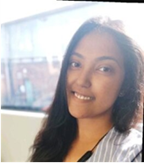 Shilpa Sharma has a strong passion for human rights that have led her to different roles as a teacher, education project coordinator and learning designer, along with receiving a Master's degree in Human Rights from the University of Sussex. She has experience of teaching as a fellow at “Teach for India” and has been working with government and charities since 2016 at the intersection of education and human rights.
Shilpa Sharma has a strong passion for human rights that have led her to different roles as a teacher, education project coordinator and learning designer, along with receiving a Master's degree in Human Rights from the University of Sussex. She has experience of teaching as a fellow at “Teach for India” and has been working with government and charities since 2016 at the intersection of education and human rights.
"Education in itself is not enough until it gives our students hope, self-belief and access to opportunities to break the cycles of oppression and emerge as confident and responsible human beings. A focus on inclusion makes it possible for educators to look at education from a holistic lens and support equitable learning for all students."
 Helen Andrews has worked in education for over ten years as a teacher, SENCo, and senior leader. Currently, she is an Education Consultant specialising in Inclusion and SEND. Helen has worked as an Assistant Headteacher for Inclusion and Designated Safeguarding Lead. Helen has a particular interest in supporting pupils with Social, Emotional, and Mental Health (SEMH) needs, and, in addition to her work with ASE, she works with an Alternative Provision.
Helen Andrews has worked in education for over ten years as a teacher, SENCo, and senior leader. Currently, she is an Education Consultant specialising in Inclusion and SEND. Helen has worked as an Assistant Headteacher for Inclusion and Designated Safeguarding Lead. Helen has a particular interest in supporting pupils with Social, Emotional, and Mental Health (SEMH) needs, and, in addition to her work with ASE, she works with an Alternative Provision.
"I believe students do well in school if they: feel safe, feel heard, feel included, and feel like they belong. So, inclusive practice in schools is fundamental to creating a learning environment conducive to positive outcomes for all, and a space where our young people can develop without prejudice or barriers to their learning."
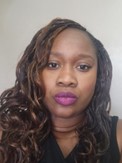 Abena Akuffo-Kelly has more than 16 years of experience as a computer science teacher and leader. She is a union activist, a local councillor, a mentor and coach. She speaks and trains on race and ethnicity, gender, LGBT rights and neurodiversity. As a consultant, she specialises in EdTech and holds many freelance roles with STEM Learning. She empowers women by teaching them programming and computational concepts to help them to enter the Tech industry. She aims to be deliberately and unapologetically intersectional in all of her activities and has contributed to a book on diversity and inclusion in education to share her ideas.
Abena Akuffo-Kelly has more than 16 years of experience as a computer science teacher and leader. She is a union activist, a local councillor, a mentor and coach. She speaks and trains on race and ethnicity, gender, LGBT rights and neurodiversity. As a consultant, she specialises in EdTech and holds many freelance roles with STEM Learning. She empowers women by teaching them programming and computational concepts to help them to enter the Tech industry. She aims to be deliberately and unapologetically intersectional in all of her activities and has contributed to a book on diversity and inclusion in education to share her ideas.
"Inclusion is not having to elbow your way through to sit at the table, nor having to bring your own chair. Inclusion is already having a seat allocated to you because your voice is not at the periphery but is central to the conversation."

